Shiv Sena leader Sanjay Raut speaks to media as he comes out after meeting NCP chief Sharad Pawar at the latter’s residence in New Delhi on Monday.
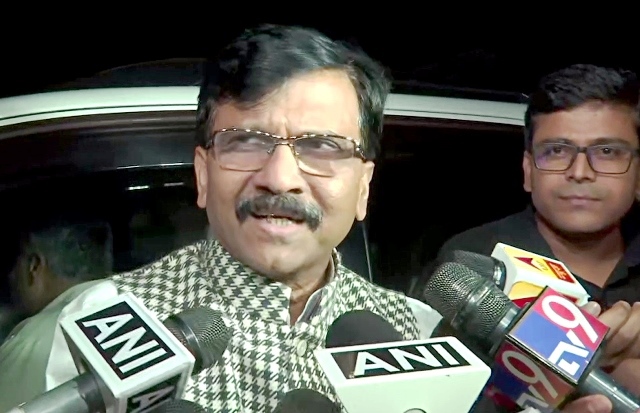

Shiv Sena leader Sanjay Raut speaks to media as he comes out after meeting NCP chief Sharad Pawar at the latter’s residence in New Delhi on Monday.
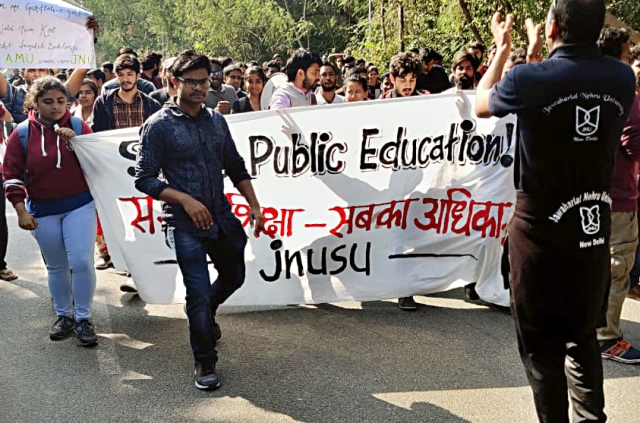
JNU students march towards Parliament over their demand of complete fee roll back along with other demands, in New Delhi on Monday.
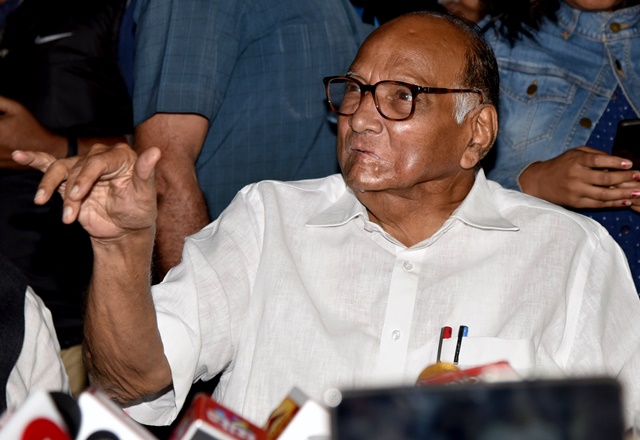
Giving a new twist to the emerging political scene in Maharashtra, Nationalist Congress Party (NCP) chief Sharad Pawar on Monday said that the path of NCP-Congress is different from that of BJP-Shiv Sena’s.
His statement comes at a time when NCP and Congress are mulling over the possibilities of forming the government with Shiv Sena in Maharashtra.
“BJP-Shiv Sena fought together, we (NCP) and Congress fought together. They have to choose their path and we will do our politics,” Pawar said.
Pawar is slated to meet Congress Interim President Sonia Gandhi at 4 pm today, where the two are likely to discuss the prospects of government formation in Maharashtra. However, the leader has termed it as a “courtesy meeting”.
Maharashtra came under President’s Rule last week after all the parties failed to form a government in the state.
BJP, which emerged as the single largest party, could not stake claim to form a government as its ally Shiv Sena remained firm on rotating the Chief Minister’s post and equal sharing of Cabinet berths.
Shiv Sena parted its ways with BJP to explore ways to form a government. It, however, failed to prove the support of the required number of MLAs in the time given by Governor BS Koshyari.
The Governor had then invited NCP, the third-largest party, to prove its ability to form the government, failing which the President’s Rule was imposed in the state on Tuesday last week.
The Shiv Sena is now in parley with the Congress and NCP to form a government in the state.
The BJP won 105 seats in the 288-member assembly followed by Shiv Sena 56, NCP 54 and Congress 44. (ANI)
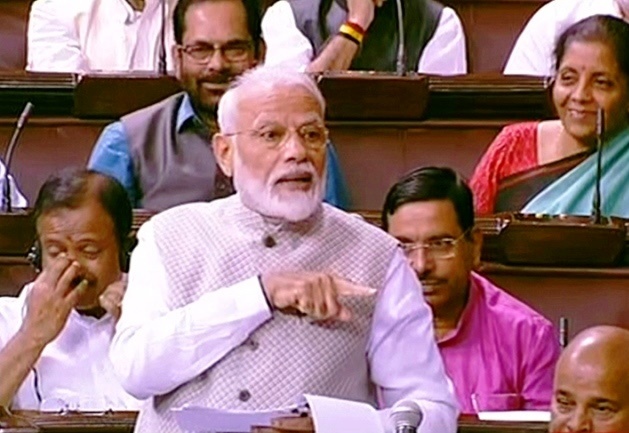
Prime Minister Narendra Modi on Monday praised Nationalist Congress Party (NCP) and Biju Janata Dal (BJD) for strictly adhering to parliamentary norms, saying they never protested in the well of the House and asserted that other parties, including BJP should learn from them.
“Today I want to appreciate two parties, NCP and BJD. These parties have strictly adhered to parliamentary norms. They have never gone into the well of the House. Yet, they have raised their points very effectively. Other parties including mine can learn from them,” he said at a discussion on 250th session of Rajya Sabha here.
Modi’s praise for the Sharad Pawar-led NCP comes at a time when there are speculations of the party forming a coalition with Congress and Shiv Sena.
Giving a new twist to the emerging political scene in Maharashtra, Pawar on Monday said that the path of NCP and Congress is different from that of BJP and Shiv Sena’s.
He made the comments in the backdrop of Maharashtra coming under President’s Rule last week after all the parties failed to form a government in the state.
BJP, which emerged as the single largest party with 105 seats in the 288-member assembly, could not stake claim to form a government as its ally Shiv Sena, that bagged 56 seats, remained firm on rotating the Chief Minister’s post and equal sharing of Cabinet berths.
Shiv Sena parted its ways with BJP to explore ways to form a government. It, however, failed to prove the support of the required number of MLAs in the time given by Governor BS Koshyari.
The Governor had then invited NCP, the third-largest party, to prove its ability to form the government, failing which the President’s Rule was imposed in the state on November 12. The NCP won 54 seats while its ally Congress garnered 44 in last month’s assembly election.
(ANI)
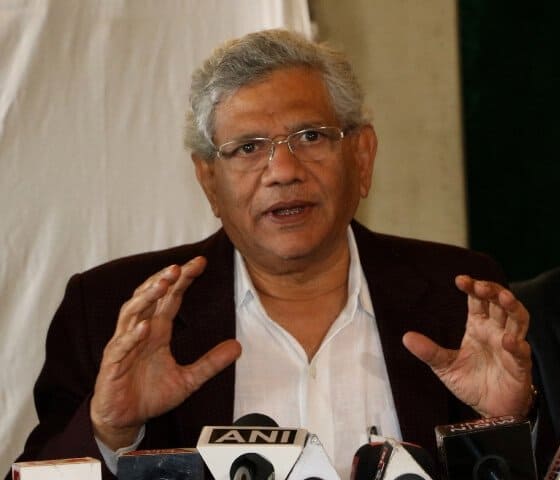
The Communist Party of India-Marxist (CPI-M) on Monday said that ‘certain premises’ of the Supreme Court judgment on the Ayodhya dispute raise ‘serious questions’ and the “verdict deviates by widening the ambit referring to Hindus and Muslims” instead of dealing with the petitioners in this case.
It also said the Supreme Court should come out with a definitive stand on the Sabarimala temple issue and noted that the majority judgment of the court has widened the scope by making a reference concerning religious rights to a seven-member bench and has created an “ambiguous and uncertain situation” by keeping the review petitions pending.
In a statement titled ‘Ayodhya dispute: Verdict delivered, not justice’ issued by the party politburo, CPI-M said it has always maintained that the resolution of the Ayodhya dispute must be through a negotiated settlement, failing which, the only way is to resolve the matter through a court verdict.
“This is the only manner in which a secular republic governed by the rule of law can deal with such a dispute. The verdict has now been delivered. There are, however, certain premises of the judgment that raise serious questions,” said the statement.
It said that the five-member Constitution bench states repeatedly the commitment to upholding constitutional values and that `the adjudication of civil claims over property must remain within the secular … The title cannot be established on the basis of faith and belief..’ Despite such declarations, the end result of the verdict has given precedence to faith and beliefs of one side. Instead of dealing with the petitioners in this case, the verdict deviates by widening the ambit referring to Hindus and Muslims,” added the statement.
It said the verdict states unambiguously that the demolition of the BabriMasjid in December 1992 was a “serious violation of law”. “But finally, hands over the site to the very forces responsible for this criminal assault. The writ filed in 1989 was represented by a leader of the Vishwa Hindu Parishad, an organisation that led the agitation that resulted in the demolition of the Babri Masjid,” said the party.
The party said the verdict states that the desecration of the mosque in December 1949 by the illegal placing of idols within the mosque was also a grave violation of the law. “Yet, the entire disputed site has been handed over to the violators of the law,” it said.
“The Hindu side’s claims of continuous possession has been upheld not on the basis of facts but it appears display of faith and belief has taken theupper hand,” the party said.
Referring to the verdict mentioning Places of Worship Act, 1991, the party said a firm resolve by the apex court to bar possibilities of other disputes being raised in the future “was not forthcoming”.
It said though the December 1949 and December 1992 incidents have been categorised as the serious violation of the law, justice has not been delivered on the perpetrators of such criminal acts.
It said that the cases must be expedited and guilty punished and the verdict “should not impinge on the delivery of justice”.
“The judicial verdict has been delivered to settle this longstandingdispute that had already claimed thousands of lives and left behind a trailof bloodshed and mayhem through communal riots for over two decades,” the party said.
On Sabarimala, it said as far as the CPI(M) is concerned, it is committed to the women’s equality in all spheres and wants the court to come out with a definitive stand at the earliest. (ANI)
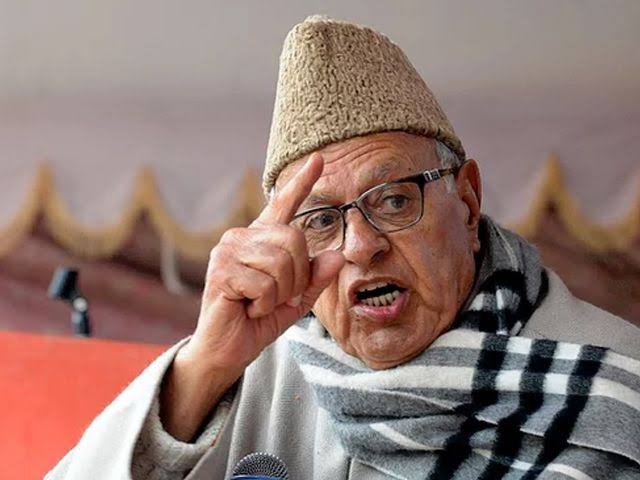
Opposition members in Lok Sabha on Monday sought the presence of National Conference (NC) member Farooq Abdullah as Speaker Om Birla informed them he has written information that he was in custody.
Members of Congress, DMK, Trinamool Congress were among those who urged the Speaker to ensure the presence of Abdullah.
Raising the issue after question hour, DMK leader TR Baalu and Saugata Roy of Trinamool Congress (TMC) urged the Speaker to issue instructions to the government for Abdullah’s presence in the House.
NC member Hasnain Masoodi said that Abdullah was in “preventive custody” under the Public Safety Act and he can be present in the House if the Speaker gives directions.
He said the Speaker was the custodian of the House and Abdullah’s presence in the House was a right of the 20 lakh people of Srinagar.
Baalu said that Abdullah’s detention was “illegal” and called upon the Speaker to interfere in the matter. “It is for you to interfere,” he said.
He also said that Farooq Abdullah’s son Omar Abdullah and PDP leader Mehbooba Mufti were also in detention.
Furthermore, Roy said that Abdullah has been in detention since August and reasons have not been given. “Either instruct the government to release him or Home Minister should make a statement in the House,” he added.
Congress leader Adhir Ranjan Chowdhury said that Abdullah was in custody for 108 days and “injustice was being done”.
He said there were continued restrictions in Jammu and Kashmir after the abrogation of Article 370 and while some MPs from Europe had been allowed to visit the Union Territory, the parliament members did not have free access to it. “It is an insult to all MPs,” he said.
Referring to a point made by Choudhary, the Speaker said that information had not come in August about Abdullah being in custody.
“Information about him being in custody has come in writing,” he said.
The Speaker added that members can discuss the matter in the Business Advisory Committee meeting and decide if they want a discussion on the issue.
Earlier, the opposition members protested in the House on various issues including their demand for Abdullah’s presence.
The members from Congress, NC, DMK came to the well of the House and raised slogans in favour of their demands which included the release of Abdullah. Also, NCP members supported them.
(ANI)
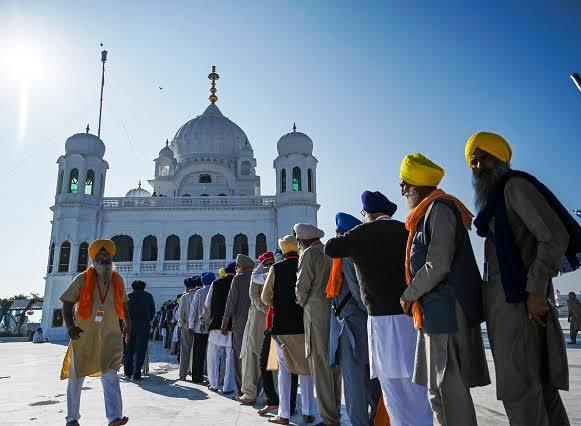
At a time where India and Pakistan have not only nuclear weapons aimed at each other but also cultural and media cannons firing constantly, the opening of the Kartarpur Sahib corridor is just short of a miracle. It was on the 550 year anniversary of Guru Nanak the founder of Sikh worldview and faith. PM Modi called it the Berlin wall moment.
Prime Minister Narendra Modi praised Imran Khan for understanding the sentiments of people of Bharat. Pakistan Prime Minister Imran Khan praised Modi for enabling the corridor, called langah in Punjabi. A rare few minutes of mutual respect in an otherwise hostile no handshakes diplomatic relations.
On crossing the corridor from one side to the other the warmth and friendly atmosphere on both sides gives the impression of being in a fairyland, far removed from the reality of everyday aggression and abuse that populates social and electronic media. Hindus, Muslims and Sikhs have worked together to make this corridor a success in almost every way.
Yet distrust, conspiracy theories, accusations have not been in short supply before the corridor was opened. All were forgotten on 9th November and will probably continue to be forgotten in this oasis of peace in an otherwise 3,323 kilometre long electrified, barbed wired hostile border across which skirmishes and casualties continue elsewhere.
Kartarpur Sahib is where Guru Nanak settled and gathered his congregation after travelling some 28,000 miles around South Asia, Middle East and Tibet meeting people of great learning. Some five kilometres away, his descendants built a town, Dera Baba Nanak, where he frequently held his talks and which was built as the River Ravi swept away the original mausoleums that marked his last rites.
The Ravi, one of the five rivers that gave Punjab (five rivers) its name, cuts across the two, with Kartarpur Sahib on the west bank and Dera Baba Nanak on the east side.
On Kartarpur Sahib side, when Guru Nanak passed away, the narrative passed down generations is that Muslims and Hindus fought over whether to bury him or cremate him. His body is said to have disappeared overnight. Both communities were left with a sheet of cloth which they cut in half. Muslims buried it and Hindus cremated it. Ironically, the India Pakistan border now runs through this area, with Muslim dominated Pakistan on one side and Hindu dominated India on the other!
The corridor says a lot about the dysfunctional hostility between India and Pakistan. Governments almost feel compelled to hate each other. Armies poised to attack but holding back, in the knowledge that the end result will be catastrophic. Nuclear weapons will make inhabitable for generations the land both seem to be coveting in their rhetoric.
It is a colonial manufactured war being played at low level with insurgencies, cross border firing and wasteful expenditure on weapons aimed at each other.
The corridor opened a window into another side, the real world affected by the division of British India. When ordinary Indians and Pakistanis meet, they talk, joke and reminisce as if they are the best of neighbours. Even the security personnel on both sides have but smiles, politeness and courtesy. Where is the anger! Where is the fire that permeates the social media waves and blurts on the megaphones?
When the people from the two sides meet, they fail to understand why the two countries cannot sort out the differences. Yet a few hundred yards from this oasis of peace, starts one of the most hostile terrains in the subcontinent. A barbed and electric fence runs across it with a 100 meter no man’s land lit by flood lights visible from space at night. The war is evident in the make-up of the border. People meet, hug, exchange small talk, then have to go back to their own borders carrying warm but confused memories.
The British created communal representation in early 1900s pitching Hindus, Sikhs and Muslims against each other in electoral camps. British India was partitioned with Muslim dominated Pakistan on one side and Hindu dominated India on the other. The majority of Sikhs went to India. Leaders of Indian Congress and Muslim League were not big enough or bright enough to outwit the British who, as papers from the period reveal, designed the partition to create a permanent state of tension.
Clearly thousands of years of Indian wisdom collapsed in the face of British ingenuity. To date the two countries face each other like fighting cocks with the master elsewhere. They are sold weapons, given training and shown how to fire their anger.
The Sikhs went over to India. The Radcliffe line, an incredibly insensitive division of land runs through without much thought given to history, populations, cultures etc. Some of the most important historic shrines of Sikhs are in Pakistan. Nankana Sahib, the birth place of Guru Nanak is in Pakistan. Kartarpur Sahib and Dera Baba Nanak, are on opposite sides of the border. Sikhs saying prayers on one side can hear from the other side at times.
One of the unintended outcomes of the Punjab insurgency has been that the Sikh leaders who took refuge in Pakistan, pushed the Pakistan Government to open the Gurdwaras to wider Sikh public. As a result Sikh pilgrims have been going to Nankana Sahib, some 70 kilometre inside the border, for over twenty years. ‘Jathas’ from India go regularly on Guru Nanak’s birthday and on Vaisakhi as well as select other holy days. Sikhs from around the world also visit the shrines in ‘religious tourism packages’. The result is that there is little appetite within Sikhs to treat Pakistan as enemy and fight for no other reason other than the two countries have an attitude.
The Kartarpur Sahib corridor has softened the Sikhs of Punjab even further. They see a splendid building, a friendly arrangement and a Pakistani side as warm as any neighbour.
It provides both a dilemma and an opportunity for India. The Sikhs of Punjab are at best indifferent to the India Pakistan tension and more likely to be unenthusiastic for any war.
Kashmir, a hostile terrain at the best of time for Indian security officers, will likely to become an even more hostile environment in the instance of a land war with Pakistan.
With two of the most important theatres of war between any conflict between India and Pakistan neutralised to some extent, the options for a land war unsupported by the local population seem to pose logistic issues. Armies fight best when the local population is with them.
The theatre of war can always move to Gujrat where there is a high decibel rhetoric for war but no history of martyrs. A conflict could finally test the Gujratis who seem to be at the forefront of hate Pakistan rhetoric around the world. However reconciling the shrill with the physical is unlikely.
It is not surprising then that PM Modi made a subtle offer to Pakistan. He said at the opening of the Kartarpur Sahib corridor that it is like the fall of the Berlin wall. He knows the hearts of the Sikhs are going to be won over by Pakistan. The most powerful arsenal in Indian armoury is being softened.
Calmly, Modi went on to say that Kartarpur Sahib corridor may be the beginning of peace between the two countries. He is hoping the oases will start to dissolve the wall all around.
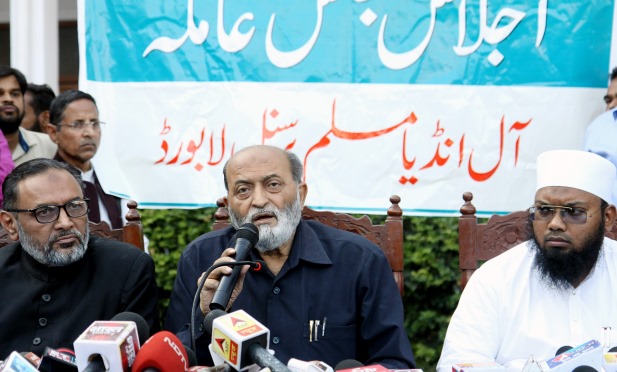
The All India Muslim Personal Law Board (AIMPLB) will make “full efforts” to file the review petition within 30 days of the pronouncement of the verdict on the Ayodhya issue by the Supreme Court.
“We will put our full efforts to file the review petitions within 30 days of Ayodhya judgment,” said Zafaryab Jilani, AIMPLB member, while addressing media persons here on Sunday.
On November 9, the Supreme Court passed a landmark judgment in the Ayodhya case directing the Central government to hand over the disputed site at Ayodhya for the construction of a temple and set up a trust for this.
The apex court also added that an alternative five acres of land at a prominent location in Ayodhya should be allotted for the construction of the mosque following consultation between the centre and state government.
“We will file a review petition. We cannot accept any other piece of ordinary land according to Sharia law. We want the same Babri Masjid land,” he said.
The Working Committee meeting of the AIMPLB held here decided to file the review petition against the Supreme Court (SC) verdict on Ayodhya issue while declining to accept the five acres of land.
“In the Supreme Court verdict, such things have been written that will lead to confrontation with each other. According to Sharia, the Masjid remains at the place where it is once built. It is not allowed as per Sharia to accept anything in place of Masjid be it land, money or any other thing adjoining it,” said Maulana Rahman while addressing the press conference.
A Supreme Court bench headed by Chief Justice Ranjan Gogoi had ordered that the Central government within 3-4 months should formulate a scheme for setting up a trust and hand over the disputed site to it for construction of a temple at the site. (ANI)
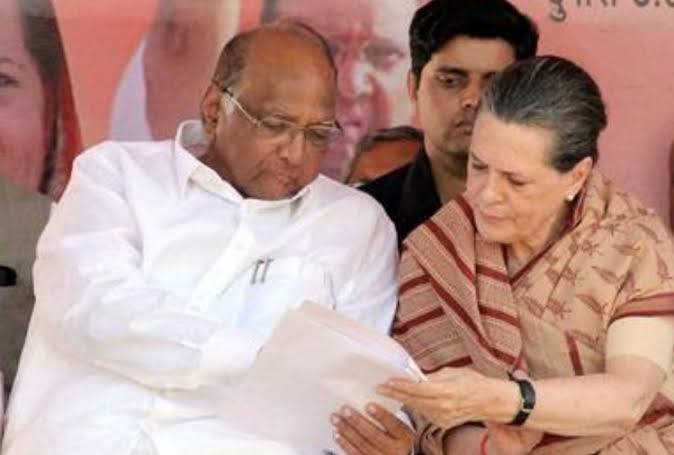
Nationalist Congress Party chief Sharad Pawar will meet Congress President Sonia Gandhi to discuss the government formation with Shiv Sena in Maharashtra on Monday, NCP leader Nawab Malik confirmed.
“Since we fought elections with Congress, we have decided to take any step further after consulting with the Congress. Our leader Sharad Pawar and Congres President Sonia Gandhi will meet tomorrow,” NCP leader Nawab Malik told media after the party’s core committee meeting here on Sunday.
After the Sharad-Sonia meeting, leaders of Congress and NCP will sit down together on Tuesday to discuss the government formation in the state, he added.
NCP’s core committee met at party chief Sharad Pawar’s residence here on Sunday. Maharashtra NCP chief Jayant Patil and Legislative Party leader Ajit Pawar were among the prominent leaders present at the meeting.
The core committee, Malik said, has “arrived at a conclusion that President’s Rule should end in Maharashtra and an alternate government should be formed at the earliest”.
Maharashtra came under President’s Rule earlier this week after all the parties failed to form a government in the state.
BJP, which emerged as the single largest party, could not stake claim to form a government as its ally Shiv Sena remained firm on rotating the Chief Minister’s post and equal sharing of Cabinet berths.
Shiv Sena parted its ways with BJP only to explore ways to form a government. It, however, failed to prove the support of the required number of MLAs in the time given by Governor BS Koshyari.
The Governor had then invited NCP, the third-largest party, to prove its ability to form the government failing which the President’s Rule was imposed in the state on Tuesday.
The Shiv Sena is now in parley with the Congress and NCP to form a government in the state.
The BJP won 105 seats in the 288-member assembly followed by Shiv Sena 56, NCP 54 and Congress 44. (ANI)
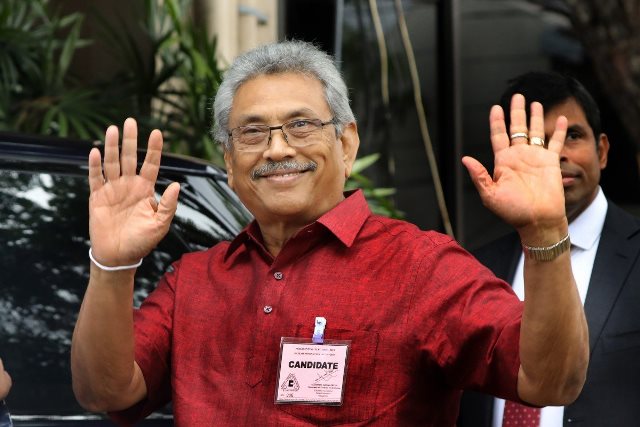
Sri Lanka’s Elections Chief Mahinda Deshapriya on Sunday afternoon confirmed that opposition candidate Gotabaya Rajapaksa had won the presidential elections.
Rajapaksa secured over 6 million or over 52 percent of the votes, Xinhua reported.
“I am grateful for the opportunity to be the President, not only of those who voted for me, but as the President of all Sri Lankans. The trust you have invested in me is deeply moving and being your president will be the greatest honor of my life – Let’s put our vision into action!” Rajapaksa tweeted.
Earlier in the day, Rajapaksa had claimed victory over his main opponent Sajith Premadasa of the ruling United National Party.
Prime Minister Narendra Modi was one of the first world leaders to congratulate Rajapaksa for his victory in the elections.
“Congratulations @GotabayaR on your victory in the Presidential elections. I look forward to working closely with you for deepening the close and fraternal ties between our two countries and citizens, and for peace, prosperity as well as security in our region,” Modi had tweeted.
“I also congratulate the people of Sri Lanka for the successful conduct of the elections,” he said.
Rajapaksa, who has been credited for having crushed the Tamil Tigers 10 years ago, focused his campaign on his credentials as the defence secretary that brought a close to the bloody 26-year civil war, while also calling for an overhaul of economic policies implemented by Premadasa’s UNP during its five-year charge of the parliament.
To win, a candidate has to secure at least 50% + one vote in the first round of counting, the Elections Commission Chairman had said.
Rajapaksa, a former defence secretary and brother of two-time former President Mahinda Rajapaksa, based his campaign on providing strong leadership on national security issues, following coordinated bombings in April that killed at least 269 people.
He will be sworn in as the seventh President of Sri Lanka tomorrow morning, November 18, in Anuradhapura, his party sources confirmed to ColomboPage.
(ANI)
When you visit any web site, it may store or retrieve information on your browser, mostly in the form of cookies. Control your personal Cookie Services here.